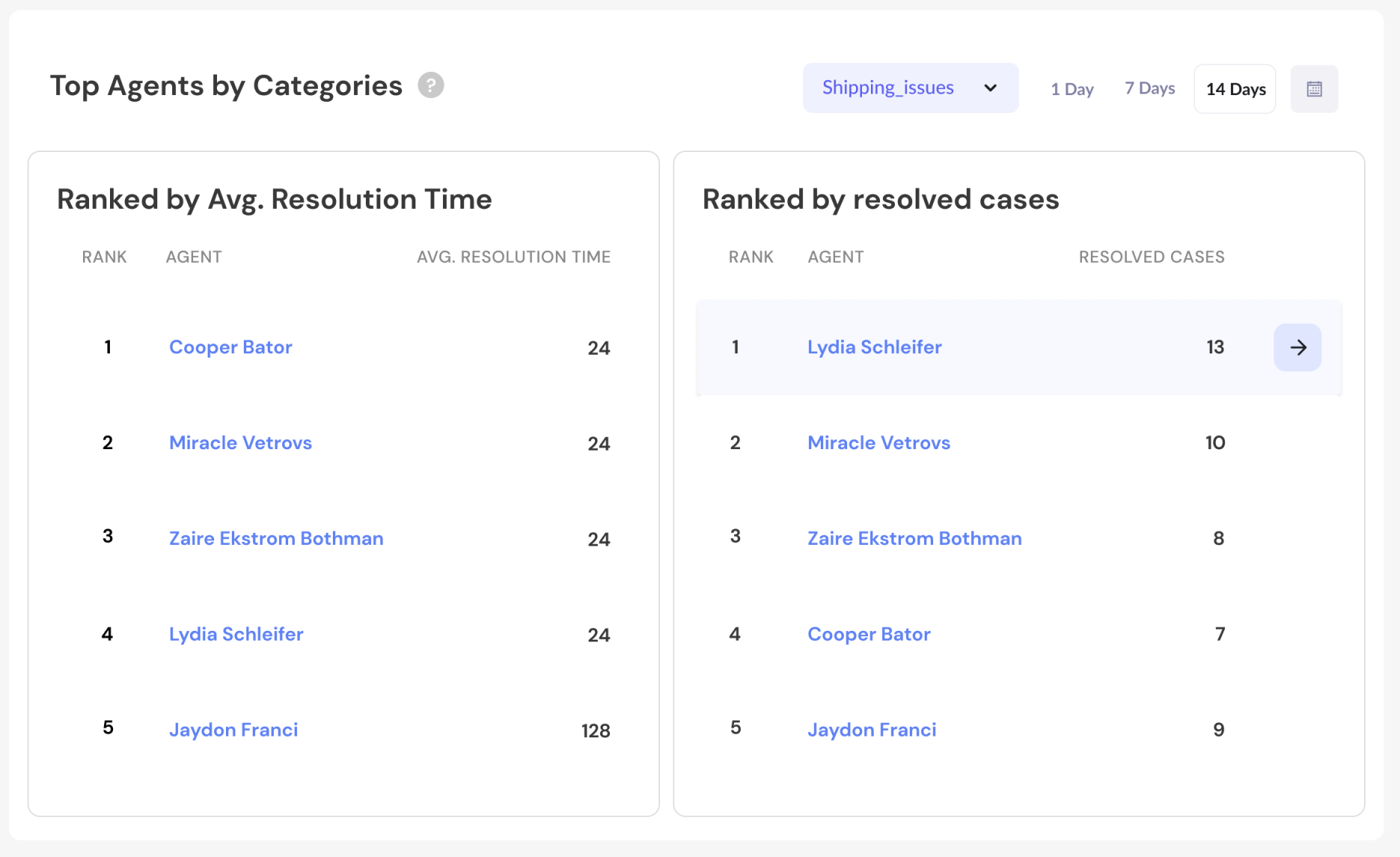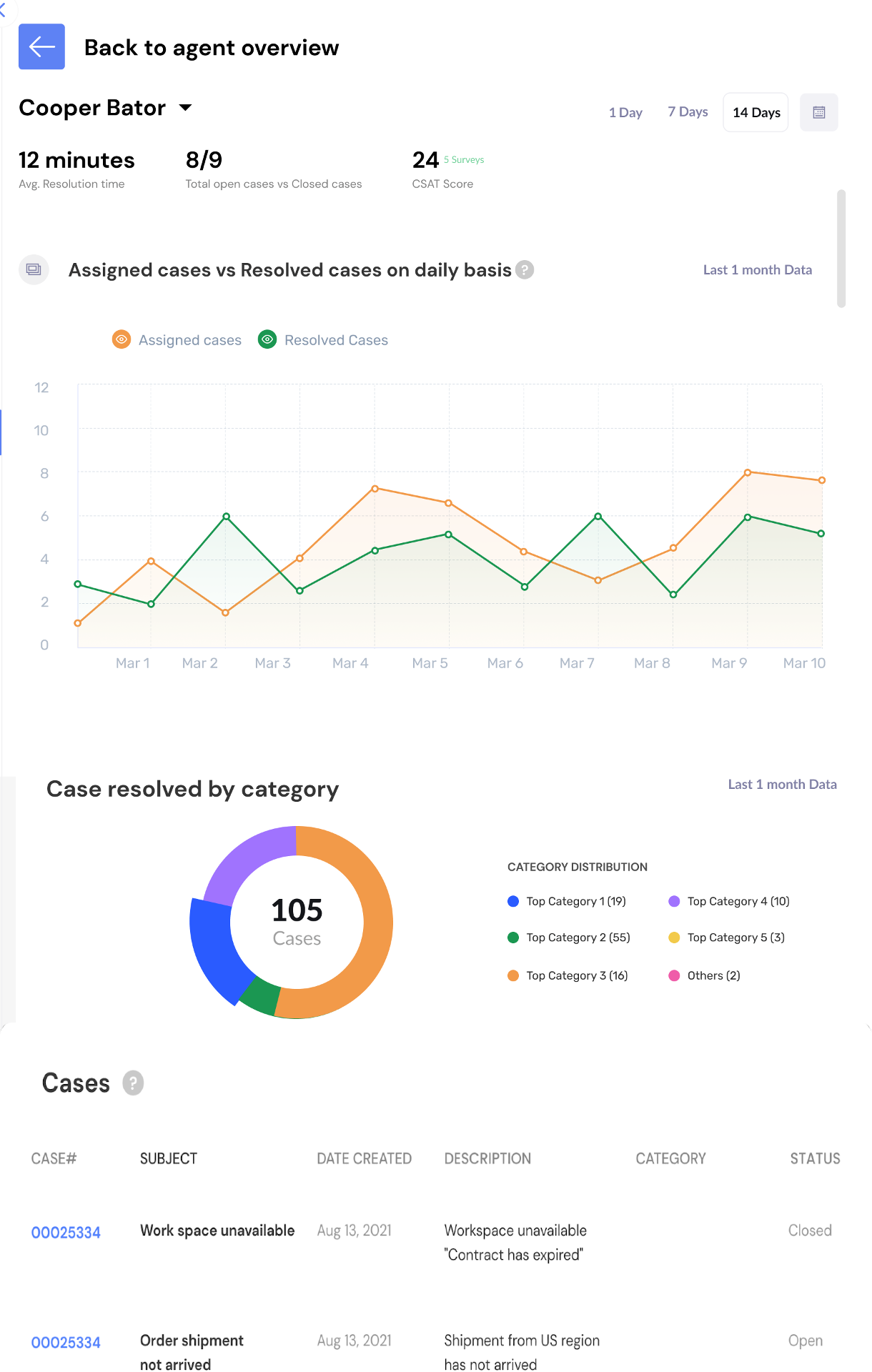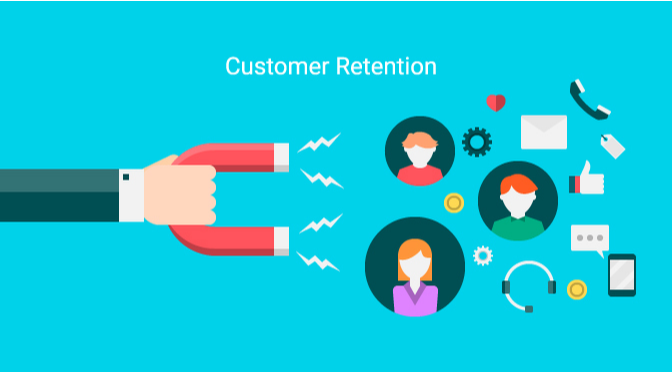Agent Analytics Provide a Holistic View of Team and Agent Performance
IrisAgent helps agents proactively uncover the true source of issues by correlating operational logs, product bugs, reports, and alerts from DevOps tools to improve response times, minimize unnecessary escalations, and measure customer satisfaction. Now, our new agent analytics report and dashboard give Customer Support leaders that same level of visibility into and track the team’s progress toward those goals. Importantly, agent analytics play a crucial role in enhancing agent productivity within contact centers, empowering them to make informed decisions that drive better business outcomes.
In the contact center setting, these analytics are pivotal in evaluating the performance of customer service agents, tracking interactions, efficiency, and effectiveness, and utilizing tools across multiple support channels to track key performance indicators (KPIs) for each agent:
Are their resolution times consistent with team goals and service level agreements?
Are they successfully closing the cases assigned to them quickly and accurately?
What is the ratio of open versus closed cases?
How do customers feel about the support they were provided by each agent?
What is Contact Center Agent Analytics?
Agent Performance Dashboard Analytics in customer support involves the collection and analysis of data related to support agents’ performance and interactions with customers. It provides valuable insights into how agents are handling inquiries, response times, issue resolution rates, and customer satisfaction and into client reporting. This analytics data helps support managers make informed decisions, such as optimizing agent workloads, identifying training needs, and improving response efficiency. By monitoring agent's performance and using data-driven metrics, businesses can enhance the quality of customer service, streamline operations, save time, create, and ultimately deliver a better overall customer experience. It is a powerful tool for maximizing the potential of support teams and driving customer satisfaction.
Agent analytics provides granular insight into the team’s performance on dimensions such as the percentage of cases resolved, resolution time, CSAT scores, domain expertise, and many others through its reporting tool. Based on those rankings and metrics, leaders can identify top-performing agents in each category or product area. Cases can then be intelligently routed to those most qualified and engaged agents based on their domain expertise. Those users with particular domain expertise can be refocused on cases with potentially high business value, so those users can always “move to the front of the line.” Additionally, by analyzing the average time spent on each customer interaction, businesses can further refine their strategies to improve both agent efficiency and customer satisfaction.

Using this holistic dashboard view of agent performance, Customer Support leaders can also quickly spot areas to improve team-wide, overall performance, as well as pinpoint agents who would benefit from additional product training or coaching and better understand client reporting in customer service interactions. IrisAgent includes a detailed view of every agent’s performance to understand how many cases they are assigned each day and the rate at which those cases are resolved. Additionally, the agent detail view graphically shows the category mix of cases resolved by each agent in the last day, week, month, or any customized time period. Finally, leaders can see the details of each case handled by that agent over any specified time period.

By adding sophisticated analytics at both the team and individual agent levels, IrisAgent provides Customer Support leaders with a full suite of important insights into team and individual agent performance metrics that identify top-performing agents by category so their expertise can be utilized to greater effect and find opportunities to lift underperforming individual agents up through additional training and coaching.
What parameters to consider for Agent Performance Analytics?
Agent analytics encompasses a range of parameters that are critical for assessing and improving the performance of customer support agents. Selecting the right key metrics for analysis is essential to understanding and enhancing agent performance. Some key agents’ parameters to consider include:
Response Times: Monitoring how quickly agents respond to customer inquiries is crucial for assessing efficiency and ensuring timely support.
Resolution Rates: Analyzing how many issues are resolved on the first contact versus escalations helps measure agent effectiveness.
Customer Satisfaction: Collecting feedback and ratings from customers can provide insights into the quality of agent interactions.
Ticket Handling: Tracking the number of tickets handled by each agent and their completion time helps manage workloads.
Knowledge Base Usage: Assessing how often agents access and use knowledge-base resources can indicate training needs.
Escalation Rates: Understanding when and why issues are escalated to higher-tier support can reveal process improvements.
Customer Feedback: Analyzing customer comments and sentiment can identify areas for agent improvement.
Agent Work Patterns: Examining agent availability, break times, and overtime can optimize scheduling and resource allocation.
After Call Work: Including the time spent on tasks related to customer interactions after the call has ended, such as updating databases and sending follow-up emails, is crucial for calculating average handling time.
Net Promoter Score: Measuring customer loyalty and satisfaction through their likelihood to recommend the service, providing insights into the overall customer relationship and word-of-mouth referrals.
By considering these parameters, businesses such as marketing agencies can gain control of a comprehensive view of agent performance and make data-driven decisions to enhance customer support operations.
For more information about how IrisAgent applies proactive AI to transform Customer Support, please schedule a chat and demo today!
Frequently Asked Questions
What is Agent Analytics, and how does it differ from traditional performance metrics?
Agent Analytics is an example of a more focused and comprehensive approach to assessing team, organization, and agent performance in various industries. Unlike traditional metrics that often focus on specific key performance indicators (KPIs), it provides a holistic view by incorporating a broader range of data, including qualitative and contextual information.
What types of data does Agent Analytics analyze to evaluate team and agent performance?
Agent Analytics analyzes a diverse set of data, including call recordings, voice call, customer interactions, response times, customer satisfaction scores, and task completion rates. By combining quantitative metrics and qualitative data, it offers clients a more nuanced understanding of agent performance.
How does Agent Analytics contribute to improving customer satisfaction?
By examining customer interactions, conversations, sentiment analysis, and feedback, Agent Analytics helps identify patterns of interactions and trends that impact customer satisfaction. This insight enables organizations to implement targeted training programs, refine processes, and enhance communication strategies to better meet customer expectations.
Can Agent Analytics be customized for different industries and business models?
Yes, Agent Analytics is highly customizable. It can be tailored to suit the specific needs and goals of employees of different industries and business models. This flexibility allows organizations to customize and focus on the metrics that are most relevant to their unique objectives.
What role does real-time monitoring play in Agent Analytics?
Real-time monitoring of customer interactions is a key feature of Agent Analytics, providing immediate insights into ongoing interactions and performance. This allows supervisors to address issues promptly, provide instant feedback, and make data-driven decisions to optimize team performance.




